- Home
- Donald Hamilton
Texas Fever Page 11
Texas Fever Read online
Page 11
“Five hundred dollars?” he asked, chortling. “Young man, I admire your gall, but I wouldn’t give you five cents for all the wild cattle in Texas, and neither, I assure you would anybody else in this town in their right mind. Personally, I doubt very much that there’ll ever be a real market for those misshapen animals. Might as well ask me for a loan on a herd of buffalo.”
“Thank you, sir,” Chuck said politely, having expected no other answer. He’d come here for the same reason he’d approached Mr. Paine: if he seemed to be doing his best to retain his cattle by legal means, people would be less likely to suspect him of planning something violent and illegal. Whoever bought the herd in the morning, whether Paine, Keller, or someone else, there was no sense in putting that person on guard.
Thinking thus, Chuck came out of the bank into blinding sunshine, and, preoccupied and momentarily dazzled, ran squarely into the tall figure of Will Reese. The collision threw Chuck back against the wall.
He heard Reese swear. “Why don’t you watch where you’re . . . Oh, it’s you! I’ve been looking for you, McAuliffe!”
Chuck straightened up. “Reckon you’ve found me.”
The bigger man’s face was grim. “I hear you’ve been lying about me, kid, telling folks I shot your dad from behind.”
Chuck looked up quickly. Reese’s voice had been unnecessarily loud, pitched to carry across the street. Already, sensing trouble, several townsmen were drifting closer to watch, while a woman coming down the walk turned and sought shelter in a nearby store.
Chuck said, “I figure the location of the bullet-hole speaks for itself, Mr. Reese.”
“I can’t help it if the man turned just as I fired.”
“If he’d known you were there,” Chuck said deliberately, “I can promise you the man wouldn’t have turned away from you, sir!”
“No? He saw me coming and started to flee, that’s how it happened.”
Chuck said, “The Old Man never ran from a Yankee in uniform. Seems unlikely one with a badge would scare him.” He drew a long breath. “If it’s a fight you want, Mr. Reese, just give me a gun and let’s get at it.”
The blond man laughed. “Mighty cocky all of a sudden, aren’t you, kid? You didn’t look so brave yesterday when I rode you down. You can be thankful I’m a merciful man. I had every right to shoot you, too, for resisting arrest.”
Chuck said dryly, “Seems I recall seeing you scratching around mighty hard trying to find a pistol. . . . In any case, I’ll save my thanks for that wall-eyed plug you were rising. And you can be grateful I was there to stop him or he’d still be running.” He breathed deeply again. “If you haven’t a gun to spare for me, sir, our Bowie knives’ll do fine—or don’t you care for cold steel up here in Kansas?”
At the back of his mind was the sheriff’s warning: You kill Will Reese, son, on any excuse whatever, and I'll see you hang! But it was too late to think of that now. There had been no choice, anyway. Obviously Reese had looked him up for the express purpose of picking a fight; and he wasn’t going to avoid it. There were times to be careful, but this wasn’t one of them, with the Old Man’s murderer standing there asking for trouble. The consequences would just have to look out for themselves.
He heard Reese laugh and address himself to the growing crowd: “Listen to the bloodthirsty little rebel wildcat!” The big deputy was unbuckling his gunbelt. “Kid, you’re in civilized country now. We don’t settle our quarrels with bloodshed here. What I’m going to do is just give you a good thrashing.”
Chuck stared at the big man, shocked. Where he’d been raised, the idea of settling a dispute barehanded never occurred to any male old enough to wear long trousers. Only kids and animals fought with the implements provided by nature: pummeling somebody with your fists was barbaric and undignified and unheard-of among gentlemen. If you were a man, you used a man’s weapons: the knife or the gun. If you hated strongly enough to fight at all, you hated strongly enough to kill.
Reese had passed his gunbelt to one of the spectators. Now he unpinned the badge from his shirt and dropped it into his pocket.
He winked at the spectators. “A little private business,” he said. He turned to Chuck, and his handsome features settled into heavy, cruel lines. “I’ll teach you to tell lies about me behind my back!”
A cold sensation of fear went through Chuck McAuliffe as he watched the larger man approach. He’d faced death several times along the trail, and he could face it again; but the idea of being smashed and beaten before an eager audience seemed more frightening than being killed. Then a wry sense of humor came to his rescue, and he thought: Looks like you’ve gone and talked yourself into one hell of a licking, my friend. Now you just go and take your medicine like a little man!
With the thought, he put his head down and charged directly at Will Reese. The sudden onslaught caught the deputy by surprise. Chuck’s head took him squarely in the stomach, and both men went off the sidewalk and down into the dust of the street together. Chuck found his feet and started flailing at the larger man’s head as Reese, breathless, struggled to get up.
For a moment, the advantage was Chuck’s, and he did the best he could with it, but Reese quickly got his arms up, shielding his face as he rose. Chuck switched his attack to the body and got in two hard blows; then a big fist came from nowhere and knocked him sprawling.
Groggy, he sat up and saw the tall deputy coming towards him. Reese passed a sleeve across his mouth to wipe away a trickle of blood. His eyes were narrow and bright with cruel anticipation. Chuck rolled aside, avoiding a kick, and rose. Instinct told him that, as the smaller and quicker man, he’d do well to stay clear of his adversary; but there was no real doubt in his mind of the outcome of this, and if he was going to get licked he might as well get it over. Dancing around out of range wouldn’t accomplish anything except maybe give him time to lose his nerve.
He moved in fast, therefore, ducked inside Reese’s whistling swing, and started pounding with all his strength at the taller man’s midsection. A short, hard blow to the side of the head sent him staggering aside; and a carefully aimed fist knocked him down. He rolled over, scrambled up, and bored in again blindly, head down. There were only two directions to go, and as long as you were moving forward you might not be accomplishing much but at least you weren’t running away.
He was knocked down again. He got up dazedly, found the big shape of his adversary against the sun, and moved in grimly, swinging. His arms were getting tired now and his nose was bleeding. He took a couple of glancing blows and, winded, managed to get in close enough to throw his arms about the larger man, pinning Reese’s arms to his sides, but the deputy broke free and swung a fist, low, that drove the last remnants of breath from Chuck’s body. As he doubled up, Reese clubbed him over the head. He went down in the dust and knew that he would now be kicked into unconsciousness by the other’s boots, but he was incapable of making a move to save himself. . . .
Nothing happened. After a little, he heard a voice that he recognized as belonging to Sheriff Kincaid. It sounded angry. Reese answered. He sounded angry, too. Hands picked Chuck up and set him on his feet and supported him there. He blinked and saw the sheriff standing before him.
“You all right, son?” Kincaid asked.
Chuck felt a cut inside his mouth with his tongue. He spat into the dust at Kincaid’s feet. They were all Yankees and he hated them all.
“Sure,” he said thickly. “I feel real fine. You got any other deputies in need of exercise, sir?”
Somebody laughed. Kincaid’s face remained sober. “Take him over to the hotel,” the sheriff said to the men on either side of Chuck. “He’s got a room there. Take care of him.”
There was kind of a gap after that. Presently he was in his hotel room, on the bed, and somebody was pulling off his boots, while somebody else cleaned the blood from his face with a damp cloth, not very gently. He looked up at the two strangers working over him.
The one at his feet said, “
You’ve got the nerve and the speed, kid, all you need is somebody to show you how to handle yourself, and you could give even Will Reese a pretty good battle.”
He looked at the two of them, hating them. He said, “We don’t fight like dogs down in Texas,” and turned his face to the wall. But after they’d gone, he started feeling badly about it. After all, they’d tried to be kind, even if they were Yankees. . . .
CHAPTER 20
Chuck came awake abruptly, without knowing what had aroused him. It was dark in the room, except for the dull rectangle of the window and the streaks of slightly more intense light defining the outlines of the ill-fitting door. Then the latch rattled, and one of those streaks widened to admit the weak yellow illumination of the lamp above the stairs at the end of the corridor.
It took Chuck a moment to recall the appearance of the room by daylight, and the disposition of his few belongings—in particular the fact that he was lying on top of the bed, fully dressed except for his boots. He could feel the Bowie knife bruising the small of his back, on the right side, as he lay there; and he turned his body cautiously to make the weapon available without causing the springs of the bed to creak. He found the hilt with his hand. Then, very slowly, watching the door, he began to draw up his knees to give himself leverage for a sudden move.
The door was still opening slowly. He could see part of a figure there, black against the light, holding something in one hand. It was unmoving for the moment, apparently listening for signs of wakefulness on the part of the occupant of the room. Suddenly the door swung wide, and light struck the bed directly. Chuck snatched out his knife and rolled to the floor, got his feet under him, and hurled himself towards the door—might as well be shot going that way as trying to jump out the window, the only other exit, two stories off the ground.
There was no explosion, no flash of gunfire, no shock of a bullet to check him; and at the last moment, ready to drive home the heavy, partially two-edged blade, he realized that the figure awaiting him had the bell-shaped silhouette of a woman rather than the clothespin-shaped silhouette of a man. He heard a woman’s gasp of fright, and his hand brushed the silk of a woman’s dress. Then, as he recoiled, he heard a woman’s soft laughter.
“Carefully, Mr. McAuliffe, or you’ll cause me to drop the bottle, which would be a shame.” After a moment, she murmured, “If you’re quite finished with the acrobatics, please cover the window before you make a light.”
He stood for a moment, foolishly, panting from his effort, suddenly aware of the bruises and contusions that he had not had time to consider sooner. He shrugged his shoulders briefly, sheathed the knife, and went to the window, aware of her entering and closing the door behind her. In the ensuing darkness, he made his way to the lamp.
When he turned—the room fully lighted now—she was still standing just inside the door, dressed as he had seen her last. She made a pretty, fashionable picture in the dismal hotel room, except for the whiskey bottle in her hand and the great bruise that disfigured one side of her face.
She saw his eyes widen. “Don’t stare, Chuck,” she said. “You look a trifle battered yourself, come to that.” Her skirts rustled as she turned towards the dresser, where stood a glass and a pitcher of water. “Only one glass?” she said.
He licked his lips, puzzled and embarrassed by her presence. “What do you want, ma’am?”
She said without turning her head, “Why, misery loves company, I reckon. I heard you’d had some trouble. I thought we could have a real interesting evening together, talking about what it feels like to be beaten. . . .” Her voice died away. She poured some whiskey into the single glass, turned, and came across the room to him, her clothes whispering. “You’ll have to drink out of the bottle, my dear,” she said. “It’s a knack I haven’t learned yet, although the way I seem to be heading, I’ll probably master it soon.”
There was bitterness and self-contempt in her voice. She held out the bottle, and he took it mechanically. She raised her glass to him. “What do you say down in Texas?”
He said, “I believe the Mexicans say salud, ma’am, but to be honest, I’ve had little experience with hard liquor. . . .”
“Well, it’s time you learned,” she said. “You’re a nice boy, Chuck, but you’d better start growing up fast, if you expect to get back those cattle of yours.”
He frowned. “How do you know I—” He checked himself, quickly, flushing.
She laughed. “Like I say,” she murmured, “you’re a boy. It’s obvious to anybody that you have some terribly wicked plan in mind. Jack Keller would like to know what it is.”
He asked, “Is that what you’re here for, ma’am, to find out for him?”
She shook her head. “I don’t care what your plan is, Chuck. I don’t want to know what it is. I just want to be sure it succeeds.” Her fingers touched her hurt cheek delicately. “Jack Keller’s got his eye on that herd, too. There are other herds, but you-all hurt his pride down at the Arkansas, you shook the confidence of his men in his leadership, and he’s got it fixed in his mind now that he’s going to get those particular cattle before any others. And Jack Keller eats nice little boys for breakfast without bothering to spit out the bones.” She raised her glass again. “Salud, Charles McAuliffe.”
He hesitated. It was perfectly clear in his mind that the bottle could be drugged or poisoned, or, more probably, that she’d come here for the express purpose of getting him drunk and talkative. He certainly had no cause to trust her. She was, he reminded himself, the person who had decoyed them to this town where the Old Man had been killed; she was obviously Jack Keller’s mistress; and what she’d said about wanting his, Chuck’s, plan to succeed didn’t seem very plausible, on the face of it.
On the other hand, the marks of Will Reese’s fists were still plain and painful on his body, and it wasn’t pleasant to remember that he’d been licked, even if by a bigger man. And the girl before him had made matters no better by talking to him as if he were a kid: he was in no mood for caution. Anyway, he’d never learn her motives in coming here unless he played along.
He’d had no experience with serious drinking, but he had, of course, tasted the stuff on the sly as boys will; he remembered enough about it not to take too much at once. He didn’t cough or choke on it, therefore, but moisture did come to his eyes. . . . He saw that Amanda Netherton was lowering her glass, empty, and smiling at him. “It’s perfectly good liquor, you see,” she murmured. He flushed slightly. “I didn’t think it wasn’t.”
“There’s no need to be polite. Of course you thought so; you’d have been a fool not to. You’re wondering why I’m here.”
“I will not,” he said, “question my good fortune.”
Her laugh rang out, delighted and happy as he remembered hearing it once before. She clapped her hand over her mouth, aghast; and they stood listening for a moment, but the hotel was silent about them. She laughed again, softly.
“Why, that was a real polished and grown-up speech, Mr. McAuliffe.”
He said, rather stiffly, “Now you’re making fun of me, ma’am.”
Her laughter died. “I don’t mean to,” she said. “I swear I don’t mean to.” After a moment, she reached up and touched his cut lip with her fingertip. “Did he hurt you badly?”
Chuck grimaced. “He damn near . . . excuse me, ma’am, he almost knocked my fool head off, but I reckon I asked for it.”
“Asked for it?” she demanded, frowning. “How?”
“A man ought to be careful what he says, even when it’s the truth. I talked myself into that licking.”
She made a little face, and felt of her cheek tenderly, “You’re very philosophical about it, Chuck. I reckon I talked myself into this, but I declare I can’t . . . can’t resign myself to being knocked around like . . .” She stopped, and looked down at her empty glass, and held it out. “One more, I think,” she said. “That should be about right.”
He started to ask her meaning, but thought better of i
t. He poured whiskey into her glass, to the level she indicated, wishing suddenly that his brother Dave was handy to advise him. Dave would have known what to make of this girl who drank hard liquor like a man, who let herself be fondled and beaten by an hombre like Keller, and who still managed to retain a certain air of quality, a look of lost innocence.
He watched her take her drink to the bed, and sit down, and sip deliberately from the glass. She looked up at him, and patted the space beside her. The last thing in the world he wanted to do was sit on a bed close to her —or was it? He didn’t know. He did remember very clearly, however, that he’d panicked from this girl once. He hadn’t hoped he’d ever have the chance to redeem himself, but he wasn’t going to pass it up if it offered itself.
He made himself walk over, therefore, and sit down. He said, “Salud, ma’am.”
“Salud, Chuck.”
They drank, and he felt nothing for a moment; then the effects of the whiskey spread warmly through his body. He looked at the small girl beside him and grinned.
“Anyway,” he said, “it beats getting licked by Will Reese.” He held out the bottle. “Put it away, ma’am. I reckon I’ve had about enough for a nice little boy.” She smiled and rose, carried the bottle to the dresser, corked it, and set it down. She finished her drink, and set the glass down beside the bottle. She turned to look at him.
“You see,” she said, “I’m not trying to get you drunk, as you thought:”
“My thoughts seem to be uncommonly easy to read, ma’am.”
“Oh, they are,” she said, smiling. “You’re thinking now that you don’t know why I’m here, but you aren’t going to be tricked into trusting me one little bit. And still you’re remembering that time by the campfire—”

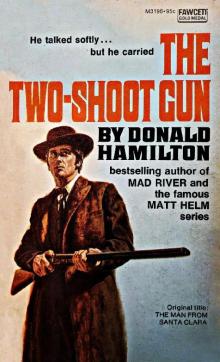 The Two-Shoot Gun
The Two-Shoot Gun Mad River
Mad River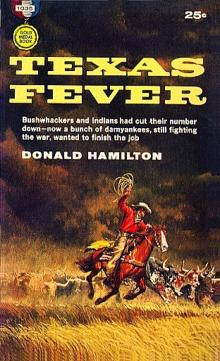 Texas Fever
Texas Fever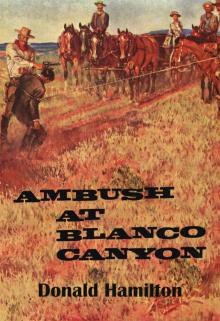 Ambush at Blanco Canyon
Ambush at Blanco Canyon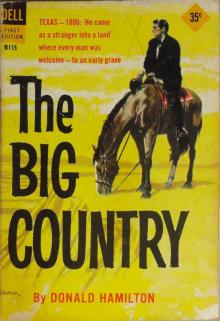 The Big Country
The Big Country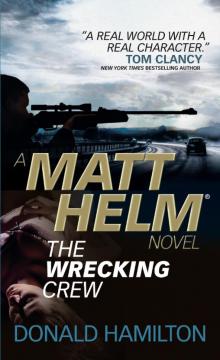 The Wrecking Crew
The Wrecking Crew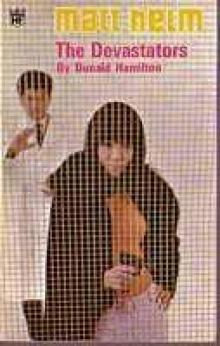 The Devastators mh-9
The Devastators mh-9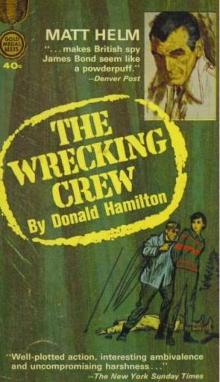 The Wrecking Crew mh-2
The Wrecking Crew mh-2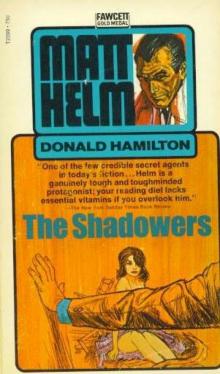 The Shadowers mh-7
The Shadowers mh-7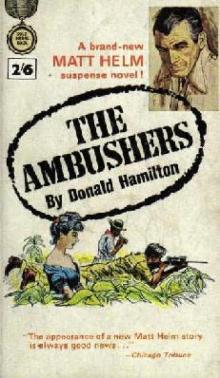 The Ambushers mh-6
The Ambushers mh-6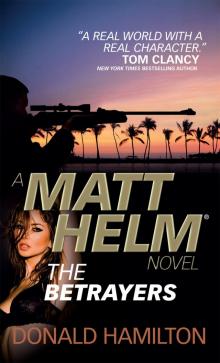 The Betrayers
The Betrayers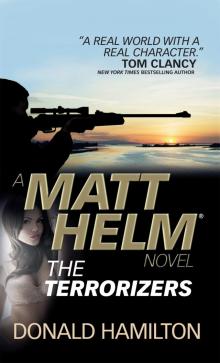 The Terrorizers
The Terrorizers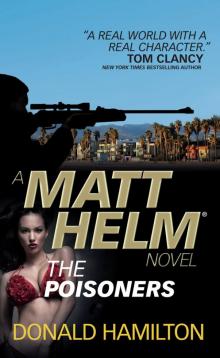 The Poisoners
The Poisoners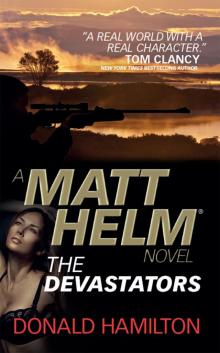 The Devastators
The Devastators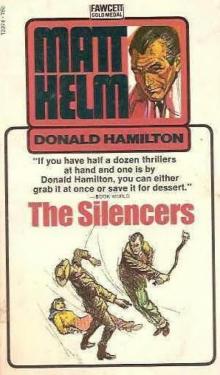 The Silencers mh-5
The Silencers mh-5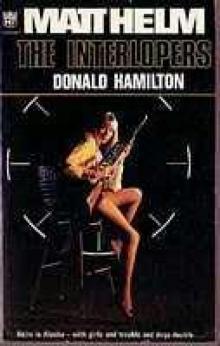 The Interlopers mh-12
The Interlopers mh-12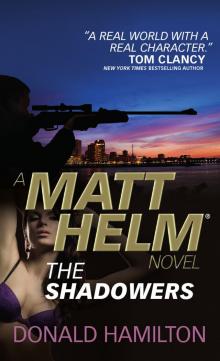 The Shadowers
The Shadowers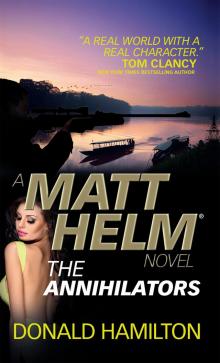 The Annihilators
The Annihilators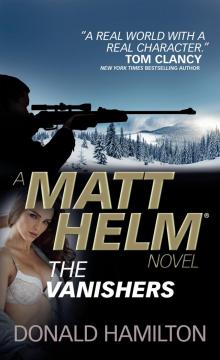 The Vanishers
The Vanishers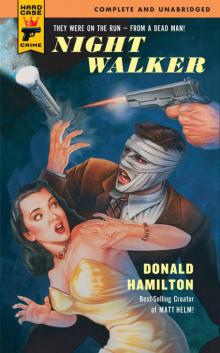 Night Walker
Night Walker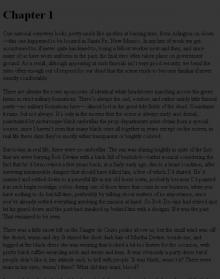 The Revengers
The Revengers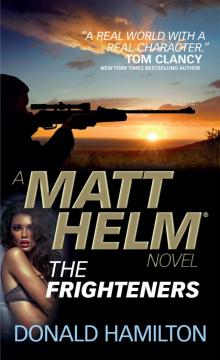 The Frighteners
The Frighteners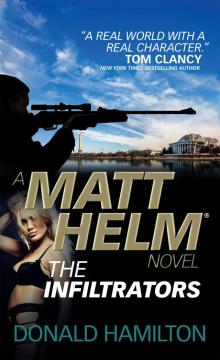 The Infiltrators
The Infiltrators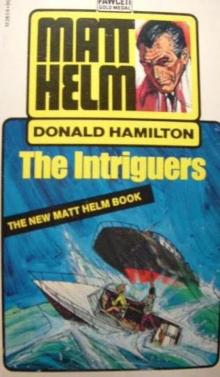 The Intriguers mh-14
The Intriguers mh-14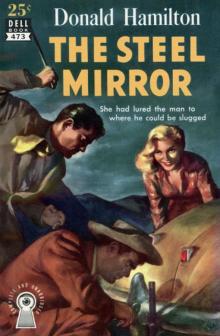 The Steel Mirror
The Steel Mirror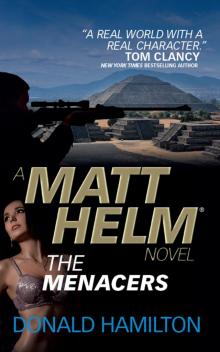 The Menacers
The Menacers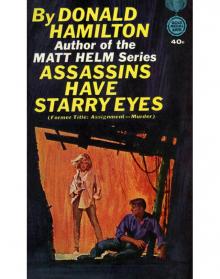 Assassins Have Starry Eyes
Assassins Have Starry Eyes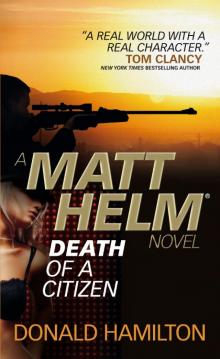 Death of a Citizen
Death of a Citizen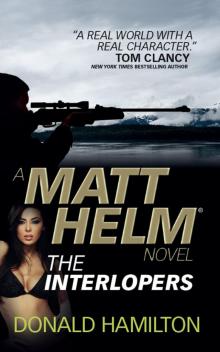 Matt Helm--The Interlopers
Matt Helm--The Interlopers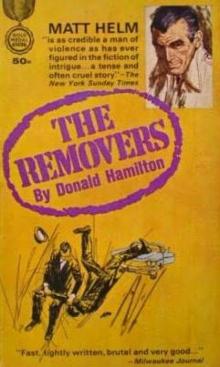 The Removers mh-3
The Removers mh-3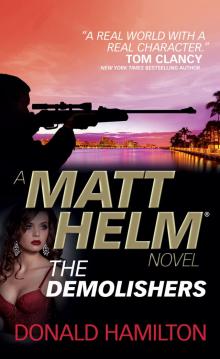 The Demolishers
The Demolishers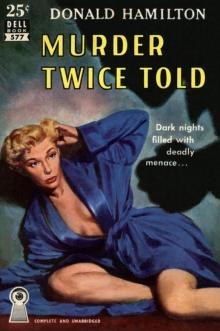 Murder Twice Told
Murder Twice Told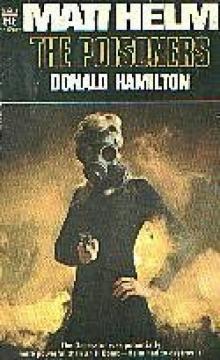 The Poisoners mh-13
The Poisoners mh-13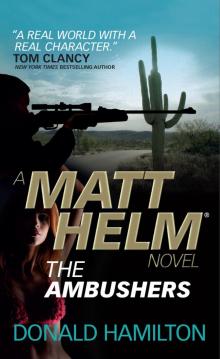 The Ambushers
The Ambushers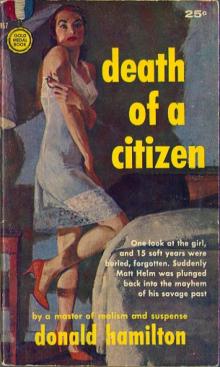 Death of a Citizen mh-1
Death of a Citizen mh-1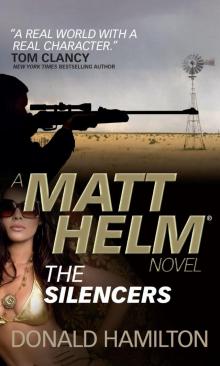 The Silencers
The Silencers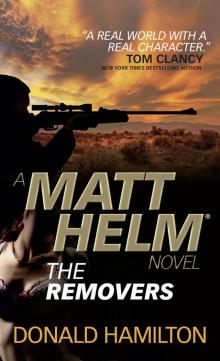 The Removers
The Removers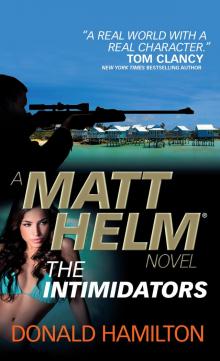 The Intimidators
The Intimidators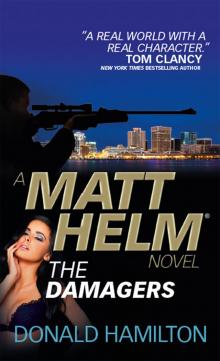 The Damagers
The Damagers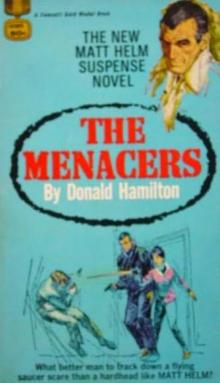 The Menacers mh-11
The Menacers mh-11 The Retaliators
The Retaliators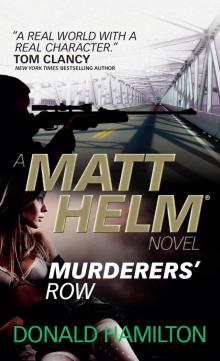 Murderers' Row
Murderers' Row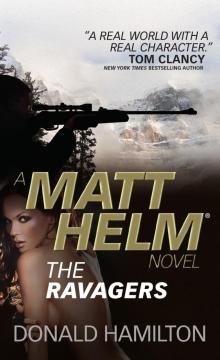 The Ravagers
The Ravagers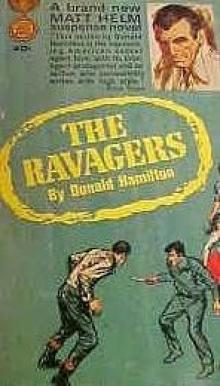 The Ravagers mh-8
The Ravagers mh-8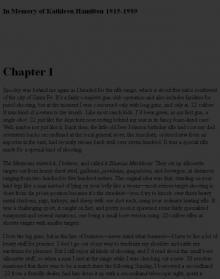 The Threateners
The Threateners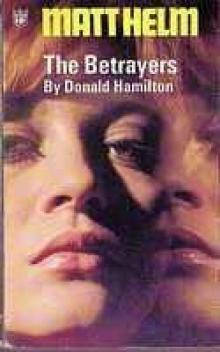 The Betrayers mh-10
The Betrayers mh-10